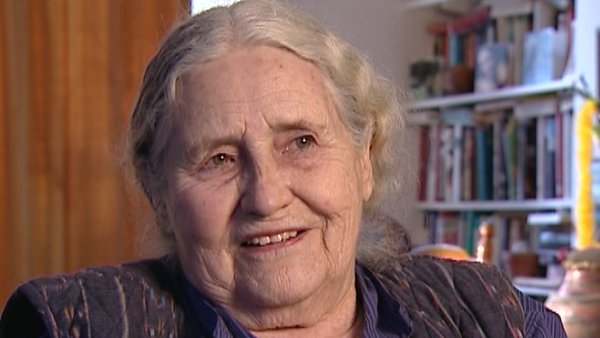NEXT STORY

Poverty, Indian restaurants and the Great Unmentionable
RELATED STORIES

NEXT STORY

Poverty, Indian restaurants and the Great Unmentionable
RELATED STORIES


|
Views | Duration | |
|---|---|---|---|
| 1. Let's write a novel! | 2 | 4276 | 04:17 |
| 2. White mistresses and menservants | 1 | 903 | 04:19 |
| 3. The Grass is Singing | 968 | 02:41 | |
| 4. When idealism encountered colonial traditions | 1 | 732 | 03:30 |
| 5. In search of a publisher | 1 | 480 | 04:51 |
| 6. 'Cry, The Beloved Country' paves the way for 'The Grass is... | 1 | 494 | 02:17 |
| 7. Poverty, Indian restaurants and the Great Unmentionable | 605 | 05:28 | |
| 8. The lamentable gap between writers and academics | 618 | 05:06 | |
| 9. The Fifth Child | 1315 | 02:48 | |
| 10. Who are the little people? | 812 | 04:14 |

So this was me being almost unbelievably innocent, and thinking that everyone had their book reprinted before publication. So it came out, and it got good reviews.
Now, this was partly luck, and one can never, ever... overestimate luck in anyone's career, because the... a book called Cry, The Beloved Country had just come out about six months before from South Africa, and had done – it was a sensation – because at that time it was believed here that the whole of Southern Africa was full of happy darkies singing and dancing and being grateful for their lot under the white man, and this book gave the lie to that. You know, the... the relevant line which is still quoted, ‘By the time we have come to loving, they will have come to hating'. I'm sorry, the other way around, ‘By the time they have come to loving, we will have come to hating'... that was this refrain running through this book Cry, The Beloved Country – Alan Paton. Now... so everyone was softened up for my book; it was not... it would have been just a... of no particular interest if that hadn't happened. So as I say, it was luck. And then suddenly there were other books about Southern Africa – there was a whole spate of them – and Southern Africa was suddenly on the map, which it wasn't before.
Now, Southern Rhodesia, because it was British, was seen as a – much better of course than South Africa, which it wasn't – it was just the same, really... so, you see, I had this, that was my phase of being a black... a black African writer. You see, because I go through phases – that was my phase of being described as being a writer about black Africa.
British writer Doris Lessing (1919-2013) was awarded the 2007 Nobel Prize in Literature. Her novels include 'The Grass is Singing', 'The Golden Notebook', and five novels collectively known as 'Canopus in Argos'. She was described by the Swedish Academy as 'that epicist of the female experience, who with scepticism, fire and visionary power has subjected a divided civilisation to scrutiny'. Lessing was the 11th woman and the oldest ever person to receive the Nobel Prize in Literature.
Title: 'Cry, The Beloved Country' paves the way for 'The Grass is Singing'
Listeners: Christopher Sykes
Christopher Sykes is an independent documentary producer who has made a number of films about science and scientists for BBC TV, Channel Four, and PBS.
Tags: Cry, The Beloved Country, South Africa, Southern Rhodesia, Alan Paton
Duration: 2 minutes, 17 seconds
Date story recorded: June 2007
Date story went live: 21 October 2011